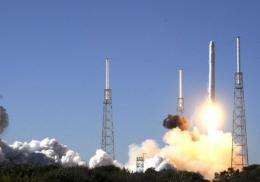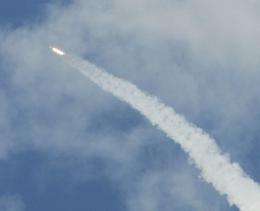US ramping up private sector's role in spaceflight

The first flight of a commercial vessel to the International Space Station in late April will signal a bigger role for the private sector and open up space tourism opportunities, industry experts and lawmakers say.
SpaceX, owned by Internet entrepreneur and PayPal founder Elon Musk, made history with its Dragon launch in December 2010, becoming the first private company to send a spacecraft into orbit and back, under a contract from NASA.
But its demonstration flight to the ISS next month, carrying 400 kilograms (880 pounds) of dried food, is a key test for the private sector, following the space agency's decision to axe its space shuttle program.
George Nield, associate administrator for commercial space transportation at the US Federal Aviation Administration (FAA), said NASA's decision was an opportunity for businesses to step in.
"We are all well aware of the historic change that has taken place in the US space program with the retirement of the space shuttle," he told lawmakers on the House science sub-committee on space and aeronautics.
"While it is certainly true the launch marked the end of an era, it also represented the beginning of what I am confident will be an exciting future in space for our nation.
"Based on market studies, we expect to see this type of activity result in a $1 billion industry within the next 10 years," he said of increasing commercial interest in space.
SpaceX said on Tuesday that NASA has not yet granted final approval of the launch date, pending completion of the Flight Readiness Review, currently expected April 16.

But April 30 has been penciled in as the date that that it will jet off from Cape Canaveral in Florida, with assistance from NASA.
NASA, which ended its shuttle to the ISS in July 2011, now wants to delegate that task to the private sector and has channeled $270 million to companies such as SpaceX, Boeing, Sierra Nevada Corporation, and Blue Origin.
In a draft budget submitted to Congress in February, President Barack Obama requested $829 million to develop commercial flights to the ISS, partly to end US reliance on Russian craft to deliver astronauts and re-supply the station.
The United States currently has to pay Russia to take its astronauts to the station, where the mission has been extended until 2020, on Soyuz craft.
The latest SpaceX launch should pave the way to more journeys into space for non-astronauts.
John Spencer, president and co-founder of the Space Tourism Society, told AFP that rich businessmen had been crucial in developing commercial interest in space, but costs should eventually drop and make such travel affordable.
"What happened over the last 10 years is half a dozen multi-billionaires from outside the space community entered the space industry," he said, naming the British entrepreneur Richard Branson.
"We see space tourism and space ports growing over the next several decades into an international industry with tens of thousands of people going off to have a unique space experience," said Spencer, who has been involved in the industry since it was first conceived in the 1980s.
He likened the situation to that of once rare adventure destinations such as Antarctica, which is now accessible to more humble travelers, and said venturing into space could eventually resemble taking a trip on a cruise ship.
"It's why those companies in the hotel and cruiseline industry... were paying attention," he said.
"We are creating visions of space experiences that are compelling and interesting, and which will widen the range of the market."
Virgin Galactic, owned by Branson, has been selling tickets for a journey into space for $200,000 each and announced that American actor Ashton Kutcher this week became its 500th customer. The company has already taken $60 million in sales and deposits.
The prices of the only trips into space so far, which were sold to private individuals traveling on Russian spacecraft, have ranged from $45 million to as much as $150 million.
(c) 2012 AFP



















